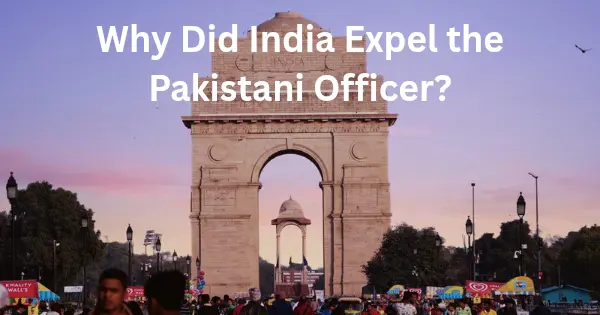On May 21, 2025, India escalated its diplomatic response by declaring another Pakistan High Commission officer ‘Persona Non Grata,’ ordering them to leave the country within 24 hours. This marks the second such expulsion in just eight days, following a similar action on May 13, 2025. According to India’s Ministry of External Affairs, the officer was not acting in accordance with their diplomatic role. Sources indicate serious allegations of espionage against the officer, intensifying the already strained India-Pakistan diplomatic relations.
This article explores the reasons behind this bold move, the meaning of ‘Persona Non Grata,’ and its implications for bilateral ties and regional stability.
What is ‘Persona Non Grata’?
The term ‘Persona Non Grata,’ Latin for “unwelcome person,” is a diplomatic designation used to declare a foreign diplomat undesirable in the host country. When labeled as such, the diplomat is required to leave immediately.
This action is considered one of the most severe diplomatic measures, signaling significant displeasure or distrust. In the context of India-Pakistan diplomacy, such expulsions underscore deep-seated tensions and mutual suspicions.
Why Did India Expel the Pakistani Officer?
India’s decision to expel the Pakistan High Commission officer stems from allegations of espionage. According to sources, the officer was involved in activities that compromised India’s national security, including gathering sensitive information. The Ministry of External Affairs stated that the officer’s actions violated diplomatic protocols, prompting swift action.
This is not an isolated incident. On May 13, 2025, India expelled another Pakistani official on similar grounds. These back-to-back expulsions highlight India’s zero-tolerance policy toward activities threatening its sovereignty.
Key Events in Recent India-Pakistan Diplomatic Spat
- May 13, 2025: India declared a Pakistan High Commission officer ‘Persona Non Grata’ for alleged espionage, ordering them to leave within 24 hours.
- May 21, 2025: A second officer faced expulsion under similar charges, reinforcing India’s firm stance.
- Official Statement: The Ministry of External Affairs emphasized that the officer’s conduct was inconsistent with their diplomatic responsibilities.
These incidents reflect a broader pattern of mistrust, with espionage allegations frequently surfacing in India-Pakistan relations.
Historical Context of India-Pakistan Diplomatic Tensions
India and Pakistan have shared a tumultuous relationship since their partition in 1947. Key issues like the Kashmir dispute, cross-border terrorism, and military standoffs have fueled distrust. Diplomatic expulsions are not new; both nations have periodically expelled each other’s diplomats over espionage allegations. However, the frequency of such actions in 2025 signals an escalation in tensions, particularly amid heightened security concerns in India.
Why India’s Response Matters
India’s decision to expel Pakistani officials reflects its unwavering commitment to national security. The government has consistently maintained a hardline stance against activities that threaten its interests, especially in light of past incidents involving espionage and cross-border tensions. These expulsions serve multiple purposes:
- Deterrence: Sending a clear message to Pakistan and other nations that India will not tolerate violations of its sovereignty.
- Domestic Assurance: Reinforcing public confidence in India’s security apparatus.
- Diplomatic Signal: Highlighting the breakdown in trust between the two nations.
However, such actions also risk retaliatory measures from Pakistan, potentially deepening the diplomatic rift.
Global Implications of the Expulsion
The expulsion of Pakistani diplomats has implications beyond bilateral relations. It underscores the fragile security dynamics in South Asia, a region critical to global geopolitics. Other nations, particularly those with strategic interests in the region, are likely to closely monitor these developments. The move also reinforces India’s image as a nation that prioritizes security and takes decisive action against perceived threats.
Moreover, repeated expulsions could complicate efforts to stabilize India-Pakistan relations, potentially affecting regional initiatives like the South Asian Association for Regional Cooperation (SAARC).
Expert Insights: What Lies Ahead?
Analysts suggest that these expulsions could lead to tit-for-tat actions, with Pakistan likely to respond by targeting Indian diplomats. This cycle of retaliatory expulsions may further erode diplomatic channels, making dialogue and de-escalation more challenging. Experts also warn that such incidents could destabilize the region, particularly if they escalate into broader confrontations.
To mitigate tensions, both nations could explore backchannel diplomacy or third-party mediation, though historical attempts have yielded limited success. For now, the focus remains on how Pakistan responds and whether these expulsions will trigger further escalation.
A Test for India-Pakistan Diplomacy
India’s decision to expel a second Pakistan High Commission officer in eight days is a bold assertion of its national security priorities. The allegations of espionage and the use of ‘Persona Non Grata’ highlight the deep mistrust between the two nations. While India’s actions are justified from a security standpoint, they risk further straining an already fragile relationship.
As South Asia watches closely, the international community hopes for restraint to prevent further escalation. For the latest updates on India-Pakistan diplomacy and regional security, stay tuned to our platform.
